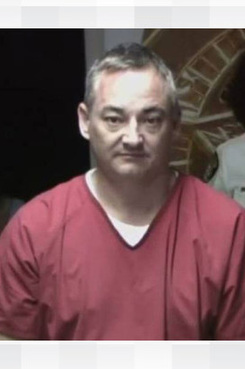Facing possible financial ruin, ex-Eric Conn clients still can’t get his files on them
Former clients of disbarred
Eastern Kentucky attorney Eric C. Conn will have to wait a little longer
to get access to files in his defunct office that might be of use in
hearings on whether they’ll continue to receive disability benefits.
The Kentucky Bar Association refused to appoint a Receiver for the files earlier, a federal prosecutor said in a court motion.
Because of the “complete abdication of responsibility by the KBA” for the files, prosecutor Darren L. McCullough asked U.S. District Judge Danny C. Reeves to appoint someone to take charge of getting the records to Conn’s former clients.
There are 6,000 to 8,000 files at the office, McCullough said in the motion.
The Kentucky Bar Association refused to appoint a Receiver for the files earlier, a federal prosecutor said in a court motion.
Because of the “complete abdication of responsibility by the KBA” for the files, prosecutor Darren L. McCullough asked U.S. District Judge Danny C. Reeves to appoint someone to take charge of getting the records to Conn’s former clients.
There are 6,000 to 8,000 files at the office, McCullough said in the motion.
The issue is important because the Social Security Administration(SSA) last month began holding hearings on whether nearly 2,000 former clients of Conn will get to keep their disability benefits.
The hearings require people to show they were disabled at the time they originally were awarded benefits, which is more than a decade in some cases, said Ned Pillersdorf, a Prestonsburg attorney who has represented dozens of former Conn clients and helped line up volunteer lawyers for others.
Social Security (SSA) won’t consider evidence from several medical professionals Conn used to complete paperwork in clients’ cases because of the potential that the information was fraudulent.
Conn admitted he filled out evaluations that doctors and a psychologist signed without doing real examinations on the clients.
However, the files in Conn’s former office may contain evidence from other medical professionals not suspected of wrongdoing, meaning it could still be used in proving eligibility, Pillersdorf said.
Pillersdorf said he has learned that Conn did not file key medical evidence in many cases.
That may have been because he didn’t want to pay the extra cost to do so and didn’t need to,
because he was bribing a Social Security ALJ David Black Daugherty.
Pillersdorf said Social Security judges SSA ALJs have refused requests from him and other attorneys representing Conn’s former clients to delay making decisions in their cases.
Many of Conn’s one-time clients can’t remember which doctors treated them a decade or more ago, so without the files Conn kept on them, many of them will have to go through hearings without information that might help them, Pillersdorf said.
That despite the old files being stored 12 miles from where the hearings are being held.
“That’s scandalous,” Pillersdorf said. “The files are relevant in that they were likely generated from 2006-2009, which is the time frame the ongoing hearings are focused on.”
Conn, who lived in Pikeville and had an office in Floyd County, is serving a 27-year prison sentence after admitting using false information in clients’ cases;
paying ALJ David Daugherty, a Social Security judge, more than $600,000 in bribes; and other charges.
Conn had been one of the most prolific Social Security disability attorneys in the nation before he was indicted in 2016, representing thousands of people in Eastern Kentucky.
Social Security said it had to make a new determination of whether about 3,700 of those people deserved to continue getting disability benefits because of Conn’s fraud.
In the first round of about 1,800, the agency kept benefits in place for about 250 people without a hearing. Of the rest, nearly 800 lost benefits.
The files at Conn’s old office might have been useful in those hearings, Pillersdorf said.
Many people turned down for continued benefits in those hearings have appealed or re-applied, but the loss of income has caused financial hardship, and at least three people committed suicide over the prospect of losing checks, Pillersdorf said.
Disability benefits are an important piece of the economy in some Eastern Kentucky counties.
The 12 counties with the highest percentage of people receiving disability payments through Social Security in 2015 were all in Eastern Kentucky, according to a report issued last year from a division of the Cabinet for Health and Family Services.
Wolfe County led that list, with 24.92 percent of residents receiving disability.
Statewide, 11.2 percent of Kentuckians received disability benefits in 2015, the second-highest rate in the nation, the report said.
Pillersdorf said he and other lawyers representing Conn’s former clients only learned last spring that there were hundreds of boxes of files regarding them at the complex of five interconnected mobile homes Conn used as an office.
Conn has been away from the office since April 2016, either on home detention or jail, or outside the country when he absconded for six months last year.
Eric Conn
was escorted by SWAT team agents prior to his extradition, at the
Toncontin International Airport, in Tegucigalpa, Honduras, Tuesday, Dec.
5, 2017. Conn, a fugitive Kentucky lawyer who escaped before facing
sentencing for his central role in a massive Social Security fraud case,
was captured Dec. 2 as he came out of a restaurant in the coastal city
of La Ceiba.
Moises Castillo AP
Pillersdorf sent the U.S. Department of Justice an email late last March asking the agency to preserve the files, which are the property of the clients.
In May, he asked the Kentucky Bar Association to appoint a special commissioner to take charge of the files.
Conn agreed to forfeit the office to the government so that it could be sold, with proceeds applied to a $5.7 million judgment imposed as part of his guilty plea.
The state bar association has a procedure in place to take control of records in the office of an attorney and distribute them to clients, such as when a lawyer dies or is disbarred, as Conn was.
However, McCullough said John D. Meyers, executive director of the bar association, notified prosecutors in June that the association would not appoint someone to take charge of Conn’s files.
Meyers said he had told a Justice Department attorney who contacted him in early April that the process for appointing a special commissioner is cumbersome and time-consuming.
Before appointing a special commissioner, the rule requires the bar association to first determine there is no one else who could wrap up matters at a defunct law office, Meyers said.
In Conn’s case, the bar association determined there was a former employee of his office who was qualified to do that, noting she is familiar with the location of the files and the filing system, he said.
Meyers said the KBA “will not speculate” on why the Justice Department and other parties decided not to let the former Conn employee do the job.
McCullough said the former employee did not have the resources for the “daunting project” of dealing with 6,000 to 8,000 abandoned files.
After the KBA decision, the Justice Department began looking for another option and decided to have Janet Stumbo, a former state Supreme Court and Appeals Court judge who is married to Pillersdorf, take control of the files and get them to Conn’s former clients.
The job, which is likely to be time consuming, would have included compensation.
The department asked Reeves to appoint Stumbo.
Reeves, however, ordered the government to submit the names of at least three potential receivers, and said they could not be family members or employees of firms involved in any matter related to claims arising from Conn’s former representation of claimants.
That would not allow Stumbo to do the job.
The effort to find another receiver could mean there wouldn’t be one in place until next year, Pillersdorf said.
“At this rate hundreds of former Conn clients either have or will have gone through hearings without their files,” he said.
The government also can’t sell Conn’s old office until the files are out of it.



 Retired Social Security judge Thomas Snook, Miami. Courtesy photo.
Retired Social Security judge Thomas Snook, Miami. Courtesy photo.
 Related:
Related:  Miami-Dade County Administrative Law Judge Timothy Maher. Photo courtesy of Miami-Dade courts.
Miami-Dade County Administrative Law Judge Timothy Maher. Photo courtesy of Miami-Dade courts.

